Islamic Heritage of Turkey Class + Extended Study |
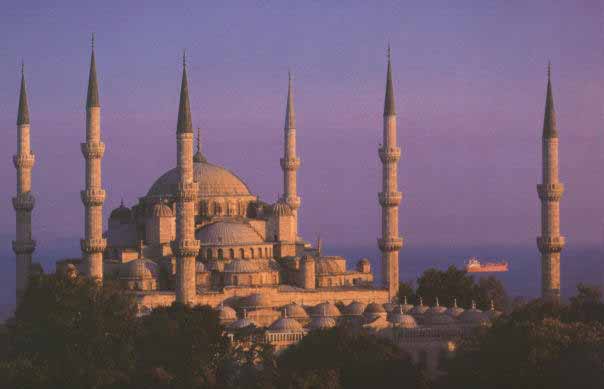 |
Islamic Heritage of Turkey Class + Extended Study |
 |
Course Description:
This is a term long reading course, culminating in a
three-week study tour in Turkey. The reading course focuses on
medieval and contemporary understandings of Islam in Turkey,
paying particularly close attention to the manifestations of
Islamic Mysticism (Sufism) in Turkey. The study tour will focus
on the city of Istanbul (ancient Constantinople), considered
among the most impressive and beautiful of ancient cities, and a
meeting place of East and West. During the time in Istanbul,
prominent Turkish scholars of Islam and Islamic history will give
lectures to the class. The tour will culminate in a visit to the
sacred pilgrimage site of Konya, the burial place of the
much-revered Rumi. No knowledge of Turkish is necessary. We will
also visit Ankara (Turkey's capital), and Ephesus (which is an ancient Christian
center). To honor Turkey's multi-religious history, we will visit
the house of the Virgin Mary, a pilgrimage center for Muslims and Christians.
Prerequisite: It is strongly suggested that the students have
completed at least one course dealing with the Islamic tradition
before taking this class. Permission of the instructor is
required.
Course Requirement:
-The class will be run in a seminar format. Fully 35% of the
students' grades will be determined from their participation in
class discussions during the reading course and also their
participation and respect for the parameters of the study tour
while in Turkey.
-Every day for class, the students are expected to come with a
2 page typed reflection and analysis of the readings. The
analysis is to raise critical questions about the readings, and
make connections with earlier readings and class discussions. It
is to culminate with a series of questions (referring
specifically to the text) that can be raised in class for further
discussions. These reflections will be gathered by the instructor
and graded.
-Each student is also expected to write a research paper for the
class. The topics will be worked out individually with the
students. Each paper is to be 15-20 pages long, and should use
scholarly sources recommended by the instructor. The paper will
count for 50% of the grade for the course.
-In addition, upon returning from the trip, each student will
write a paper that will weave together their readings, critical
analysis, and personal reflections on the trip. This paper will
count for 15% of the grade.
Books for the course:
1) Annemarie Schimmel, Mystical Dimensions of Islam, ISBN: 0807812714
2) Sheikh Muzaffer, Ozak. Love is the Wine. ISBN: 0893144258
3) I AM WIND, YOU ARE FIRE, by Annemarie SCHIMMEL. ISBN. 1570626456
The same book is also published under a different title: Rumi's World : The Life and Works of the Greatest Sufi Poet, ISBN: 0877736111
(Either of the above is just fine.)
4) Shems Friedlander, When you Hear Hoofbeats, think of a zebra
ISBN:0-939214-06-7 (paper): $7.95
5) Turkey (Eyewitness Travel Guides) (Paperback) ISBN: 0789483297
This will serve as your guidebook in the study tour. If you purchase this book, you will not need an additional tour book.
6) John Freely, Istanbul : The Imperial City (Paperback), by ISBN: 0140244611
Class Schedule:
First Day, 20 minutes: Monday January 23rd.
Wednesday January 25th, at 7 pm, 202 Hascall: intro to Sufism, overview of the trip.
Wednesday, February 1st, at 7 pm, 202 Hascall: Annemarie Schimmel, Mystical Dimensions of Islam [chapters 1, 2, 3]
Wednesday, February 8th, Annemarie Schimmel, Mystical Dimensions of Islam [chapters 4, 5, 7, Appendix 2. Browse chapter 6.]
Wednesday, February 15th, No class. Pursue your research project, and post comments on blackboard..
Wednesday, Febraury 22nd, Shems Friedlander, When you Hear Hoofbeats, think of a zebra
Wednesday, March 1st, John Freely, Istanbul : The Imperial City
Wednesday, March 8th, John Freely, Istanbul : The Imperial City
Wedesday, March 22nd, I AM WIND, YOU ARE FIRE, by Annemarie SCHIMMEL.
Wednesday, March 29th, readings on Modern Turkey
Wednesday, April 5th, Sheikh Muzaffer, Ozak. Love is the Wine.
Wednesday, April 12th, Turkish phrases
Tuesday, April 18th: Mandatory Lecture at 4:15, by Professor Shahab Ahmed of Harvard University. Location: 105 Lawrence.
Wednesday, April 19th, last day of class. Check with Omid to see if we are meeting at his house or in the regular classroom.
Wednesday, April 26th, research
Wednesday, May 3rd, research
Extended Study trip to Turkey:
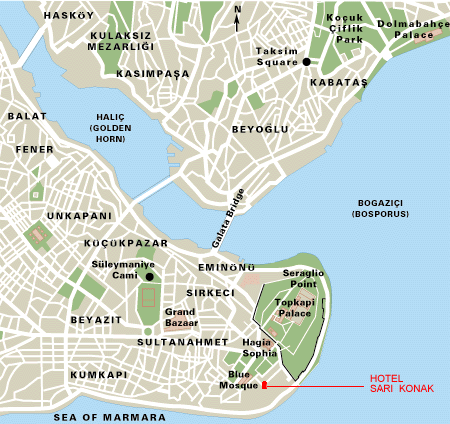 |
The Sultanahmet neighborhood is close to almost all the historical sights in the European section of Istanbul, including Topkapi palace, Aya Sophia, Blue Mosque, Grand Bazar, Suleymaniye mosque, etc. |
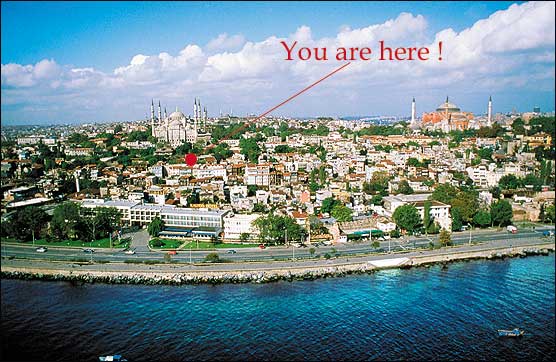 |
Our stay will, insha'allah, be in the shadow of the Blue mosque (Sultanahmet Camii), and very close to the Aya Sophia. |
After the extensive
preparation above, those students who have successfully completed
the reading section of the class will be invited for a three-week
study tour of Turkey. Ideally, the number of students on the tour
would be 20. The tour would begin on May 28th, and conclude three weeks after that
on June 18th. The study tour would begin from New York, where the instructor
would accompany the students to Turkey. At the conclusion of the study tour, the
students would be free to spend more time on their own (their budget) in Turkey or other European or Middle
Eastern countries if they have made the necessary arrangements.
The study tour would be based primarily in Istanbul. What follows
is a tentative itinerary for the trip:
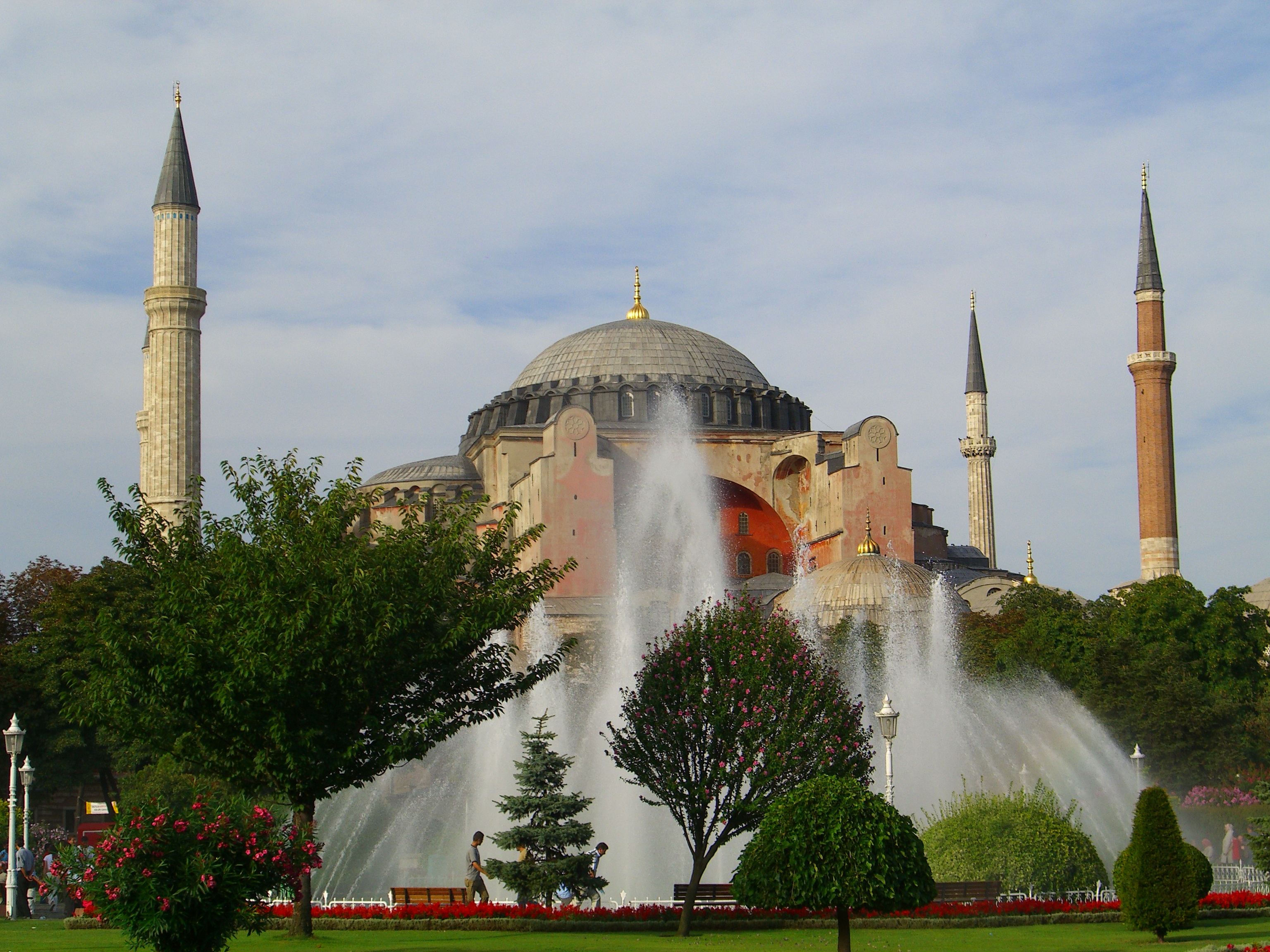 |
|
Itinerary for Turkey Extended Study
28 May: Depart the US (JFK airport) 29 May: Arrival in Istanbul Arrival transfer from the airport to the hotel. Overnight at the hotel in Istanbul 30 May Istanbul (breakfast included) Full day sightseeing tour of Istanbul including visits to Hippodrome, the place chariot races and competitive athletic events took place during the Roman period, then the Blue Mosque which is a 17th century Ottoman Mosque famous with its six minarets and magnificent interior with blue tiles.
31 May: Istanbul (breakfast included) Full day tour of Dolmabahce Palace Palace - the rococo 19th century residence of the Ottoman sultans and the place where the founder of Modern Turkey, Ataturk died in 1938. The Dolmabahce Palace is beautifully situated with a 600m frontage on the Bosphorus.
01 June: Istanbul (breakfast included) Full day tour of Istanbul including visits to the famous Spice market, cruise by ferry which crosses the Bosphorus. The cruise terminates at the fishing village of Sarıyer close to the Black Sea. Continue to the Sabancı Museum.
02 June: Istanbul (breakfast included) Turkish & Islamic Arts Museum, a great collection of artifacts from many civilizations of Anatolia, St. Sophia, the great Byzantine Basilica built in the 6th century. Rest of day at leisure.
03 June: Istanbul (breakfast included) Day at leisure. Afternoon visit to the Grand Bazaar, famous shopping center offering shopping opportunities for carpets, jewelry, leather, etc. 04 June: Istanbul – Ankara (breakfast included) Depart Istanbul for Ankara. Upon late afternoon arrival in Ankara, visit the Anatolian Civilizations Museum and view numerous finds from Paleolithic Age, Neolithic Age, Hittites, Urartians, Phrygians and many others.
05 June: Ankara – Cappadocia (Breakfast, Dinner included) En route to Cappadocia visit the Mausoleum of Atatürk, the burial place of the national hero who founded the modern Turkish Republic. After a picturesque trip along the Salt Lake visit to the 13th century Seljukian Caravanseri Ağzıkarahan. 06 June: Cappadocia (B, D) Visit to the fortress in Uçhisar and view the Cappadocia region, proceed to the open air museum through Göreme Valley. Visit to the early Christian churches decorated with unique frescoes depicting various scenes from the Bible. Visit to Zelve and Avanos. 07 June: Cappadocia (Breakfast, Dinner included) Drive to Kaymaklı to visit the Underground City, the place early Christians hid from Arabic persecutors. 08 June: Cappadocia – Konya (B, D) Transfer to Konya..At night , go to the Mosque of Shems-e-Tabrizi.
09 June: Konya (Breakfast, Dinner) Visit the Mausoleum of Mevlana and proceed to the Karatay Theological School.
10 June: Konya - Pamukkale. (Breakfast, Dinner) In the early morning, quick visit back to the Mevlana Museum. Depart for Pamukkale
11 June: Pamukkale – Kusadasi (Breakfast, Dinner) Visit the fascinating archaeological site of Hierapolis, the thermal resort founded by a Pergamene King in 190 BC and greatly enlarged and embellished by the Romans. Continue to Izmir. Dinner and overnight at the hotel in Kusadasi
12 June: Kusadasi – Istanbul (Breakfast) Visit Ephesus, home of the Greek Philosopher Heraclitus , the amphitheaters, the marble road, library of Celsus, temple of Hadrian, the Odeon, the museum of Selcuk and the house of Virgin Mary. Transfer to Izmir airport for an evening flight to Istanbul. Arrival in Istanbul and transfer to hotel.
13 June: Istanbul (Breakfast) Full day tour of Istanbul including visits to the St.Chora museum, the 11th century church of St. Saviour in Chora is, after St. Sophia, the most important Byzantine monument in Istanbul. The walls are decorated with superb 14th century frescoes and mosaics on a gold background. These influenced the European Renaissance. The church is a remarkable museum of Byzantine art. Here you will find a quiet, carefully tended garden facing old wooden houses, where you can enjoy tea or coffee. Continue to the Mosque of Suleyman the Magnificent, where he and his wife, Hurrem Sultan (Roxelane), are buried, is considered the most beautiful of all imperial mosques in Istanbul.
14 June: Istanbul (Breakfast) Full day tour of Istanbul including visits to the Topkapı Palace residence of the Ottoman sultans between the 15th and 19th centuries. The jeweled turban crests, silken caftans and priceless Chinese porcelains of the palace bear witness to the grandeur of a bygone era. The porcelain collection is considered the finest anywhere outside China. Continue to the Archeological museum which was founded by painter and archeologist Osman Hamdi on June 13, 1891. Continue to the Archeological Museum which was founded by painter and archeologist Osman Hamdi on June 13, 1891.
15 June; Istanbul (Breakfast) Visit the Ahrida Synagogue, Church of Paamakaritros and Greek Orthodox Patriarche, if permitted.
16 June: Istanbul (Breakfast) Day at leisure. Archeological Museum which was founded by painter and archeologist Osman Hamdi on June 13, 1891. [No transportation needed.]
17 June: Istanbul (Breakfast) Day at leisure.
18 June: Return to US (Breakfast ) Departure transfer from hotel to airport
*Visit to Mevlana Galatasarai for Whirling Dervishes show. *One Turkish bath for the whole group (separate for men and women) *Monday or Thursday night visit to Jerrahi Dergah.
Lectures, insha'allah! * Lecture by Sherif Catalkaya on practices of Islamic
mysticism
|
Accommodations in Turkey:
In Istanbul, we will stay in the following two hotels. Both are considered
among historical hotels, in the delightful Sultanahmet neighborhood.
You'll be about a one minute walk away from the Blue Mosque (Sultanahmet Mosque)
and a two minute walk from the Aya Sophia.
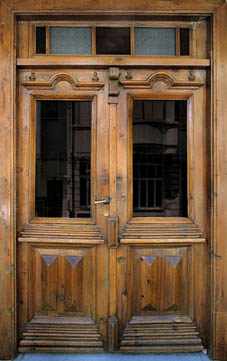 |
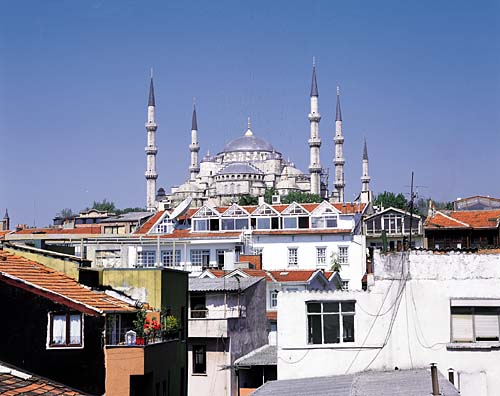 |
|
Door to the Sari Konak |
Roof view from Avicenna Hotel |
Istanbul Accommodations:
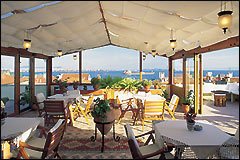 |
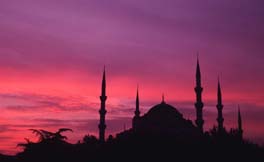 |
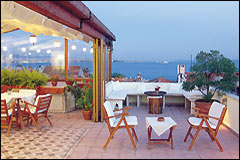 |
|
View from the roof of Sari Konak |
||
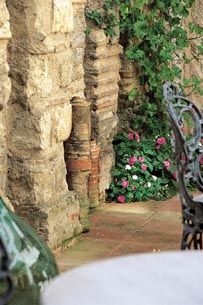 |
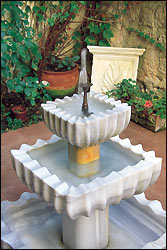 |
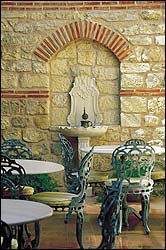 |
|
Charming Garden of the Sari Konak |
||
You can also do panoramic 360 degree tours of the Avicenna Hotel at:
http://www.avicennahotel.com/facilities.htm
Praise for the hotels:
“ To open a hotel of this category in
Sultanahmet where there were plenty of hotels , was something that needed
courage... But the bet was won. There is everything
to please you at Istanbul Hotel Sari Konak…"
Guide du Routard Istanbul Turkey
" This converted Ottoman mansion is one of
the most attractive small hotels in Sultanahmet "
Eyewitness Travel Guides - Istanbul Turkey
" If Topkapi Palace has gems , among the
small Istanbul hotels, Sari Konak Hotel is as precious ..."
The Weekend Australian
"...Next time , I'm convinced that I 'll
come here first ..."
Frommers Travel Guide Turkey
"The dedicated service afforded by the Okan
Family and the hotel staff creates a most
welcoming atmosphere and their attention to even the smallest detail is evident
throughout this small Istanbul hotel..."
Johansens Recommended Hotels 2000
Some Useful information about Istanbul, more to come:
Things to do in Istanbul (courtesy of Sari Konak)
In Konya, we'll stay in Hotel Dundar:
In Cappadocia, we'll stay in
hotel Peri Tower.
This hotel is considered an intriguing architectural example of modern Turkish
art,
drawing on ancient Cappadocian themes.
for one example of images,
Hotel Peri Tower
Visa regulations:
US citizens can obtain a visa immediately upon arrival in the
Istanbul airport,
for a cost of about $40 cash. s
Make sure that your passport is up to date, and valid.
citizens of other nations should check with the Turkish embassy, at:
Grading Standards:
Here are the standards for each grade:
A
Superb, Excellent. An ability to offer original and insightful
analysis of the facts.
B
Solid Work. The facts have been grasped, and significant moves
have been made to interpret the material in an analytical
fashion.
C
The student has made a reasonable attempt to attend the class,
and has a fair grasp of the factual material presented. The
analysis of these facts, and an attempt to contribute towards an
original interpretation, however, is severely missing.
D
A simplistic familiarity with the subject mater can be gleamed
through the assignments which have been turned in.
F
A disappointment—no attempt being shown on the behalf of the
student to engage the material, to respect the parameters of the
class and its schedule, or the turning in of assignment.
Directions for "Talking points"
A note on "Talking points" and Class participation:
This course can only be successful if we have daily, active discussions. That will only happen if you have spent time before coming to class pondering over the readings. To aid you in this, you are are asked to bring a focused "talking point" (around 3-4 pages) to every class. A talking point is a form of dialogue between you and the readings: that is to say, reflections and queries you are prepared to share with a classmate and/or with the instructor. Your daily "talking points" will play a considerable role in shaping the day's discussion. Every talking point must contain 2-3 written questions to be asked in class. The talking points, which will be first exchanged with your colleagues and then gathered by me, count for 20% of your final grade.
I leave it up to you to decide how you will engage the text in your talking point:
*reflect on an idea you
found interesting or intriguing in the readings,
*discuss who the various readings complement or differ from one
another,
*explore the implications of a particular idea,
*compare to another work we've studied,
*trace how the work speaks to a theme we encountered earlier.